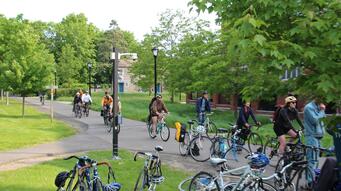Mobility
Yale in Motion
A focus on health and physical activity encourages the Yale community to be more active on campus, reduce vehicle usage, improve air quality, and reduce congestion on the roads.
Yale’s Efforts
- Over one-third of Yale employees live in the City of New Haven, and increasingly choose to walk, bike, or ride the Yale Shuttle to work.
- Yale has partnered with the city and other local employers to encourage use of the expanding infrastructure and programs for walking, biking and using transit.
- The Yale Community Carbon Fund allows those who commute to or travel for Yale to support local efficiency projects and offset their emissions.
- Bike/Walk Yale, a subgroup of the Traffic Safety Committee, manages initiatives to enhance bike and pedestrian infrastructure on campus. They also encourage active transportation through incentive programs and communications and ensure that University planning processes are holistic in their approach to transportation systems. Participating departments include the Office of Sustainability, Facilities Operations, University Planning, Public Safety, and the University Wellness Leadership Group.
What You Can Do
- Avoiding single occupancy vehicle use can save you time and money while improving air quality and reducing emissions. Learn more about the resources Yale provides.
- Join the fun. GoNewHavenGo offers resources and programming to make sustainable transportation easy. CT Rides offers free commuter counseling to all Yale affiliates.
- Concerned about your safety? Download the LiveSafe app for resources to keep you safe while walking and biking in New Haven.
Our Objectives and Goals
Alternative Transportation Systems
Enhance and support systems for alternative and active transportation
In support of Yale’s goal to reach net-zero emissions by 2035, Yale Printing & Publishing Services (YPPS) purchased an electric cargo van in spring 2024. The van, which is used for copier moves and deliveries, will save hundreds of gallons of gasoline and reduce greenhouse gas emissions, helping elevate economic prosperity, resiliency, and health and well-being at Yale. As one of the first Yale departments to purchase an electric cargo van, YPPS serves as a model for other departments that are considering the switch to an electric vehicle. YPPS plans to add more EVs to their fleet in the future.
Sustainable Transportation Framework
By 2019, complete a Sustainable Transportation Framework and related analyses for enhancing sustainable transportation infrastructure on and across Yale campuses.
This goal was achieved in 2019 upon completion of the Sustainable Transportation Study. To date, several recommendations have been implemented and others are in process. The university continues to coordinate with the City of New Haven on two-way street conversions, intersection improvements, and other municipal projects.
Campus Circulation
By 2025, enhance Yale’s strategy for safe, convenient, and resilient circulation around campus.
Yale Transit has enhanced shuttle services in the past year by expanding nighttime service; creating new routes to support rail ridership and respond to rider needs; and adding a real-time bus tracking app to improve the user experience. Yale Shuttle ridership increased by 23% from 2023 to 2024.
Electric Vehicle Infrastructure
By 2025, increase electric vehicle charging infrastructure by 250% above 2019 levels.
This goal was achieved in 2023. In 2019, Yale had five single-hose electric vehicle charging stations available for fleet vehicles and drivers parking on campus. Since then, 38 dual-hose units have been installed, for a total of 76 charging options. Thirteen of Yale’s fleet vehicles are electric. University policy requires that all new vehicle purchases be alternative fuel.
Sustainable Transportation Choices
Advance transportation choices that improve human health and environmental vitality
Sustainable Commuting
By 2025, increase the proportion of Yale community members commuting to campus using sustainable transportation modes by 10% above 2015 levels.
Our 2023 Transportation Survey results demonstrated a 1.2% increase in Yale commuters’ use of sustainable transportation modes since 2015, as well as a 2% increase in the use of public transit since 2021. To explore the most current campus mobility data, visit the Sustainability Data Hub.







